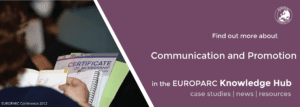Communicating Protected Areas in Europe: a Study Tour outcome
Triglav National Park
Article issued by Baiba Ralle
Every year, the Alfred Toepfer Natural Heritage Scholarship supports the work of young professionals in protected areas across Europe. Baiba was one of the winners of the Scholarship in 2018. Read about her Study Tour, exploring the topic of ‘Communicating Protected Areas in Europe’.
Raising environmental awareness
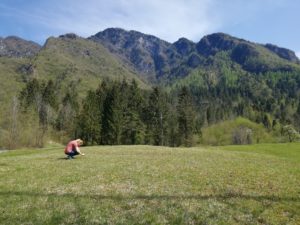
Dolomiti Bellunesi National Park
Communication of protected areas is one of the most important issues nowadays. Since society in its wider sense is the one who directly and indirectly impacts nature conservation processes, only raising its awareness of the importance of nature values can bring sustainable development for future generations. Therefore, managers of protected areas (PAs) are currently in front of an important task to reach human minds in the most effective way to activate their care for ongoing local and national nature processes.
To ensure sustainable development for future generations, society needs to be better aware of the importance of nature.
To improve communication practices of PAs in her country, Latvia, Baiba Ralle made a study tour to four different protected areas in Europe. The objective of the study was to examine how these PAs are organizing communication process, what kind of actions they are proud of and what are the challenges they have to overcome when dealing with this difficult topic.
Watch a short video about her Study Trip:
The study tour was organized in protected landscape area Central Bohemian Uplands in Czech Republic, Saxon Switzerland National Park in Germany, Dolomiti Bellunesi National Park in Italy and Triglav National Park in Slovenia. While visiting PAs, the main interest was to meet PA professionals and discuss their practices in public relations, nature education, society involvement and sustainable tourism.
Despite the situation being very different in different PAs in Europe (administration, financial support and overall governmental system, cultural level, etc.), it turned out that all the territories are facing almost the same challenges which has led to the result of setting up communication work as inseparable unit in official documents dedicated to establishment of PA as a platform of conservation of nature and culture values.
Creativity to overcome lack of finance
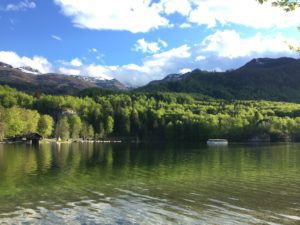
Triglav National Park
One of the biggest challenges in the nature conservation process that all the visited territories are facing and overcoming is insufficient financial support for communication and education activities. Therefore, the study visit has showed that PAs are subjects of creativity and cooperation, of managing and/or supporting different outstanding projects/ methods/ solutions towards more successful /sustainable ways of protecting and conserving nature and cultural values of PAs for coexistence of both – nature and human beings in the future.
PAs use creativity and cooperation to find more successful ways of protecting and conserving nature and cultural values.
All the territories are dealing with the constantly growing number of visitors and struggling/working with solutions to handle such a big number of people coming to the territory for nature recreation and education in very different patterns (mostly active recreation – the biggest threat for nature).
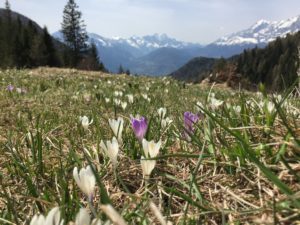
Dolomiti Bellunesi National Park
For all visited territories, biodiversity conservation challenges are crucial, including tireless “translation” work on the topic of nature friendly attitude and behavior towards nature conservation, explaining these matters in popular language that people can relate to and understand, while using PAs facilities.
It is very well done by establishing differently managed information centers and points with different exhibitions, functions and activities, creating brilliant communication campaigns on sustainable tourism matters addressed to wide audience, as well as nature education programs offered for schoolchildren – very important audience who will impact the nature processes in the future.
Innovative nature classes for children
Nature interpretation has become extremely important due to the current situation, when it is very hard to keep children’s attention. Nature education work in all visited PAs tends to walk out of the standardized education systems still implemented at schools, and instead make schoolchildren use all senses during the nature classes – sight, hearing, smell and touch, thus grabbing participants’ attention and reaching the aim of understanding nature and insuring long term conservation and management aims.
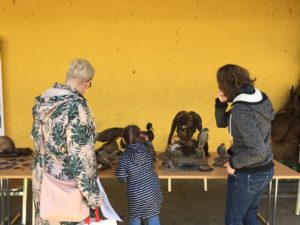
Central Bohemian Uplands, Earth day
Due to lack of human resources, PAs have given great models and examples of how effective in nature education can be cooperation with (1) non-governmental entities, (2) officially established Parks’ Guide network or (3) joint cooperation with university students and some source of funding.
Visited territories have brought evidence and highlighted both the importance of traditional forms of communication still in place, especially regarding communication with local communities (in many territories there is a big issue of constantly aging inhabitants and therefore extreme importance for consumption of traditional media), as well as growing importance of social media in the communication with younger audience – potential PA visitors, living only in this informative space.
Involving local inhabitants
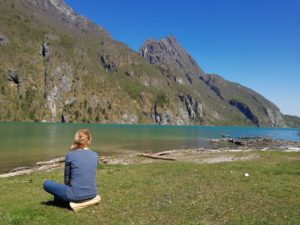
Dolomiti Bellunesi National Park
PAs have also done great efforts regarding local population and economic sectors, trying to reach the aim of locals as conscious members of PA’s structures, feeling the area as a powerful tool to support their business needs and cultural identity, as well as having an empathy and interest for to the protection needs of the territory.
They have showed good example of successful cooperation with local inhabitants within the aim to save Park’s agricultural heritage, as well as to provide local inhabitants the possibility to become volunteer rangers (nature protection guards) of the territory, thus involving local people in the nature awareness raising activities and ensuring their loyalty to the PAs. Another important direction PAs are working towards is sustainable tourism – some efforts include creation of supportive systems for local businesses and producers like quality mark, as well as participation in the European Charter for Sustainable Tourism in Protected Areas.
Overall, the study tour has showed how great communication efforts in different European PAs are being made to change attitudes and behavior of people in the sense of nature conservation step by step, paving the positive outcomes for future generations.
The study has resulted in a full bunch of new tools and ideas, an inspiration to improve communication practices not only at Baiba’s home institution, but also all around Europe, to reach effective improvement of public awareness and sense of ownership of our common natural and cultural heritage, which is the basis for sustainability of any conservation efforts. It is critically important to pass good knowledge from country to country, and connect them for the most positive result in the future.
